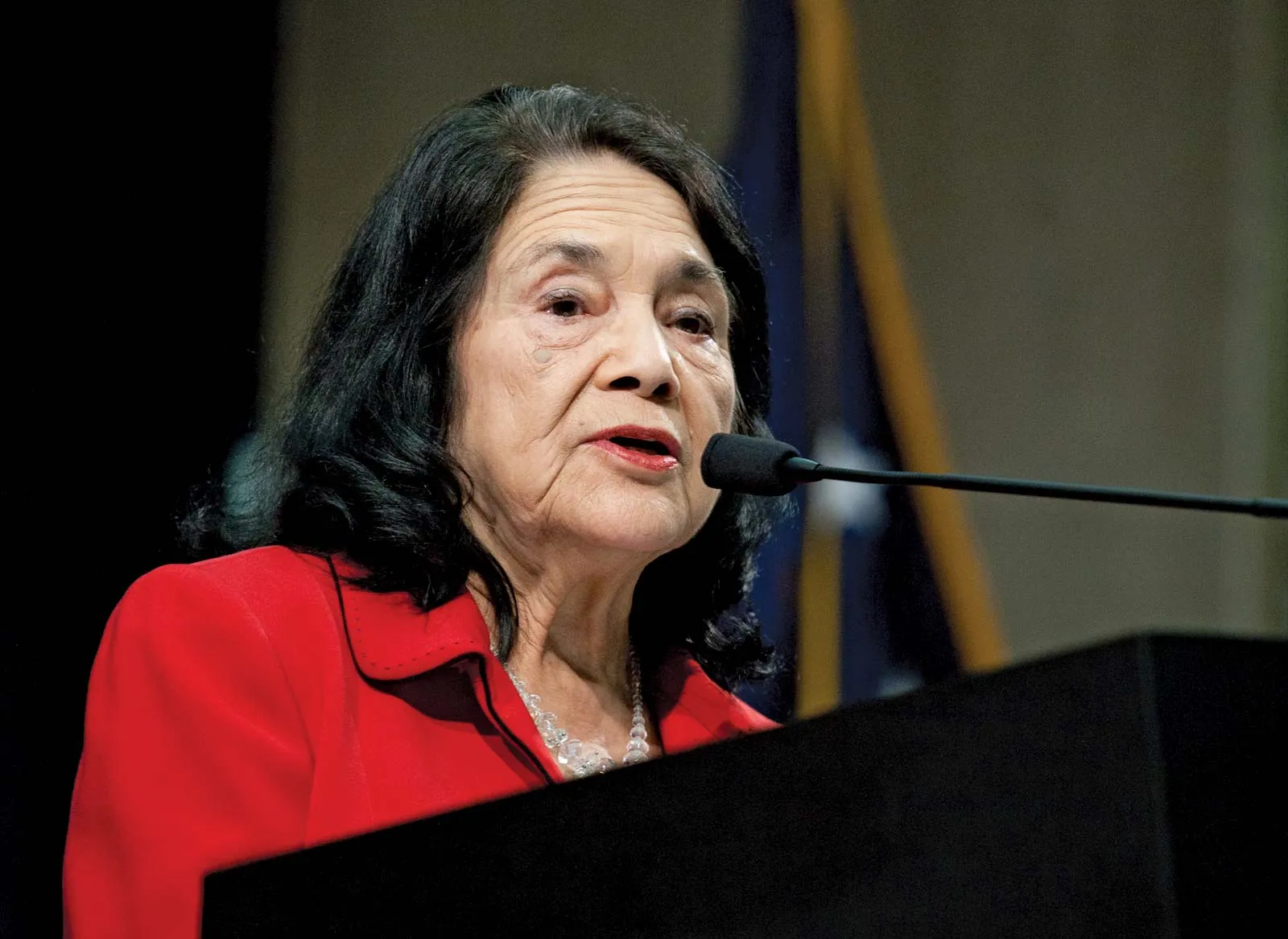Dolores Huerta’s life is a powerful testament to the strength of grassroots activism, as she dedicated her career to advocating for farmworkers’ rights and empowering marginalized communities across the United States.
Early Life and Background
Dolores Clara Fernández Huerta was born on April 10, 1930, in Dawson, New Mexico, to Juan Fernández, a farmworker, and Alicia Chávez, a schoolteacher. Huerta’s mother was an influential figure in her early life, and her example of hard work and dedication to the community deeply shaped Huerta’s future commitment to social justice. When Huerta was three years old, her parents divorced, and she moved with her mother and siblings to Stockton, California. There, her mother became a strong advocate for her children’s education and worked to support her family.
Huerta was always a passionate student, excelling in her studies and showing an early interest in activism and social issues. She graduated from Stockton High School in 1947 and went on to attend the University of Pacific, where she studied education. After completing her teaching degree, Huerta worked as a schoolteacher in the early 1950s, primarily working with children from migrant farmworker families. It was during this time that Huerta became acutely aware of the harsh conditions that farmworkers endured, and she began to feel a deep responsibility to fight for their rights.
Early Involvement in Activism
In the late 1950s, Huerta met Cesar Chavez, who was already organizing farmworkers and advocating for their rights. The two quickly formed a close professional partnership, and Huerta became involved with the Community Service Organization (CSO), a grassroots organization dedicated to helping Latinos in California gain civil rights and political power. In 1960, Huerta became the CSO’s lead organizer, where she organized voter registration drives and advocated for better education and employment opportunities for Latinos.
Through her work with the CSO, Huerta’s belief in the importance of community organizing and political activism grew, and she became increasingly focused on the plight of farmworkers. She saw firsthand the injustices that farmworkers faced, including long hours, poor working conditions, and low wages. Huerta began to devote herself entirely to labor organizing, realizing that improving the conditions of farmworkers was her life’s work.
Co-Founding the United Farm Workers (UFW)
In 1962, Huerta and Chavez co-founded the United Farm Workers (UFW) to advocate for farmworkers’ rights. Huerta was instrumental in organizing farmworkers and helping them establish collective bargaining agreements with employers. She played a central role in the creation of the UFW, utilizing her skills as a community organizer to mobilize farmworkers across the state of California.
One of Huerta’s most significant contributions to the labor movement was her involvement in the 1965 Delano grape strike. When farmworkers in Delano, California, led by Chavez, began a strike to protest poor working conditions and wages, Huerta played a key role in the success of the movement. She helped to organize the strike, which led to a national boycott of Delano grapes. Huerta’s leadership during the strike and her ability to galvanize support from communities across the country played a crucial role in its success.
The grape boycott, which lasted for five years, brought national attention to the plight of farmworkers and led to major changes in labor laws. In 1970, after years of protests and boycotts, farmworkers were able to secure better wages, working conditions, and healthcare benefits through union contracts. The UFW’s success in the Delano grape strike was a major victory for the farmworker movement and a testament to Huerta’s organizational skills and leadership.
Advocacy for Women and Social Justice
Throughout her career, Huerta has been a vocal advocate for women’s rights, particularly in the context of the labor movement. Although many farmworker unions were male-dominated, Huerta worked to empower women within the UFW and ensure they had leadership opportunities. She recognized the unique challenges that women faced, particularly in the farmworking community, where women often worked long hours alongside men for lower wages.
Huerta’s commitment to gender equality was evident in her own leadership role within the UFW. In addition to her work with farmworkers, she fought to create opportunities for women within the labor movement and to challenge the traditional gender norms that often kept women out of leadership positions. Huerta herself became a powerful symbol of women’s empowerment and leadership, and her activism helped pave the way for future generations of women in labor and civil rights movements.
Huerta was also an advocate for education and political empowerment, believing that empowering marginalized communities through education and political engagement was key to social change. She worked to increase voter registration in Latino communities and lobbied for the inclusion of more Latinx history and culture in school curricula. Her efforts to ensure that the voices of marginalized communities were heard led her to be a lifelong advocate for equal rights, civil rights, and social justice.
Achievements and Recognition
Over the course of her life, Huerta received numerous accolades for her work as a labor leader and civil rights activist. In 1993, she was awarded the Eleanor Roosevelt Award for Human Rights by President Bill Clinton, recognizing her tireless efforts to improve the lives of farmworkers. She has received numerous other awards, including the Presidential Medal of Freedom in 2012, one of the highest civilian honors in the United States.
In addition to her work with the UFW, Huerta has continued to be a powerful advocate for social change. She founded the Dolores Huerta Foundation in 2002 to empower communities to build grassroots leadership and advocate for social, environmental, and economic justice. The foundation continues to work on issues such as voter engagement, immigration reform, and community development.
Huerta’s work has influenced generations of activists, particularly those involved in labor and civil rights movements. Her work alongside Cesar Chavez to organize farmworkers and improve conditions for Latinos in the U.S. has left a lasting impact on the American labor movement. She has become a symbol of resistance and resilience, known for her passionate speeches, her organizing expertise, and her commitment to social justice.
Legacy and Continuing Impact
Dolores Huerta’s legacy as a leader, activist, and advocate for social justice continues to resonate today. Her impact on the labor movement and her efforts to improve the lives of farmworkers have made her an iconic figure in the history of the American labor movement. Huerta’s dedication to education, women’s rights, and political empowerment has helped shape the future of advocacy for marginalized communities.
Through the Dolores Huerta Foundation and her ongoing work as a public speaker and activist, Huerta continues to inspire and educate future generations of activists. She has become an important role model for women, people of color, and those fighting for economic and social justice. Huerta’s life and achievements stand as a testament to the power of grassroots organizing and the importance of standing up for what is right, even in the face of adversity.
Dolores Huerta’s life story is a powerful reminder that one person can make a difference. Her tireless dedication to the rights of farmworkers, women, and marginalized communities has changed the course of American history, and her continued activism ensures that her impact will be felt for generations to come.





